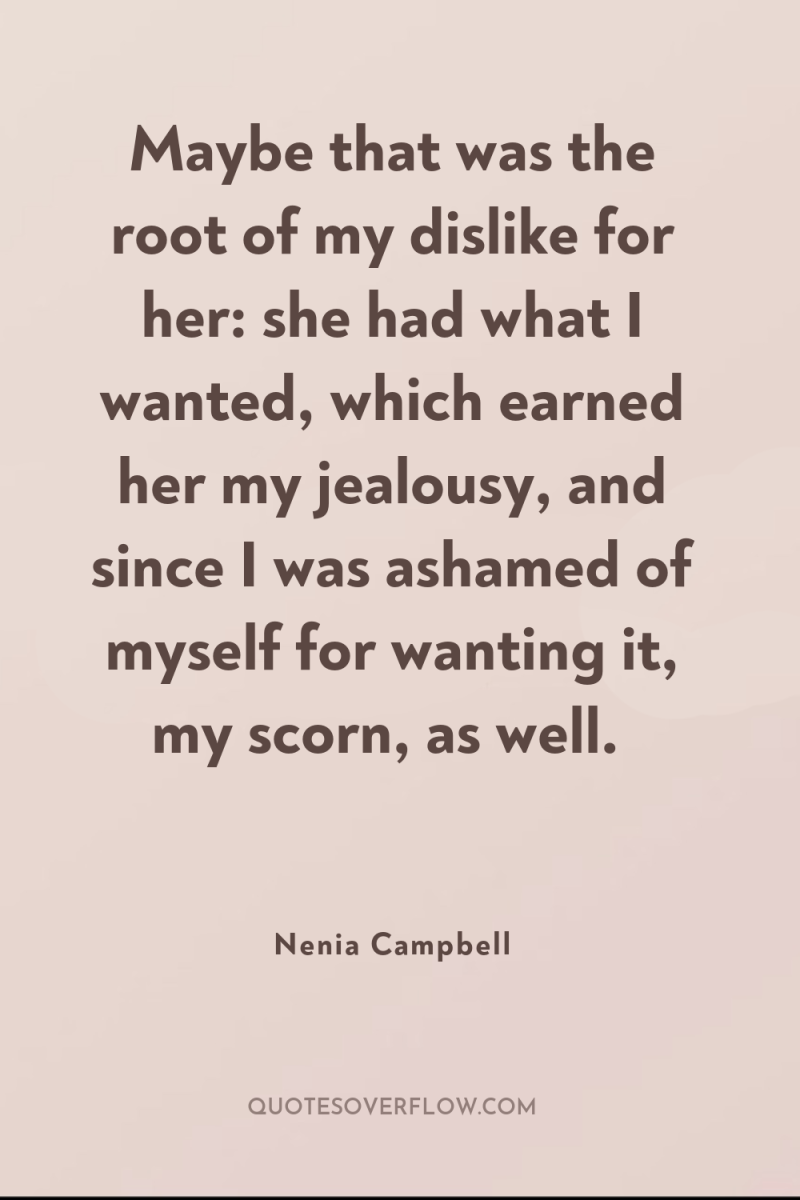1
I would rather a romantic relationship turn into contempt than turn into apathy. The passion in the extremities make it appear as though it once meant something. We grow from hot or cold, but lukewarm is the biggest insult.Criss Jami
2
You are mistaken, Mr. Darcy, if you suppose that the mode of your declaration affected me in any other way, than as it spared the concern which I might have felt in refusing you, had you behaved in a more gentlemanlike manner." (Elizabeth Bennett)Jane Austen
3
Why should you want to give up a child's wise not-understanding in exchange for defensiveness and scorn, since not-understanding is, after all, a way of being alone, whereas defensiveness and scorn are a participation in precisely what, by these means, you want to separate yourself from.Rainer Maria Rilke

4
When I was young, I thought I was a bird at one time. Then they told me I can't fly, so I stopped flying.Anthony Liccione

5
The best way to drive out the devil, if he will not yield to texts of Scripture, is to jeer and flout him, for he cannot bear scorn.Martin Luther

6
Maybe that was the root of my dislike for her: she had what I wanted, which earned her my jealousy, and since I was ashamed of myself for wanting it, my scorn, as well.Nenia Campbell

7
D'Artagnan had time to reflect that women - those gentle doves - treat one another more cruelly than bears and tigers.Alexandre Dumas
8
Sarcasm is waster on the young.Bert McCoy
9
We read the pagan sacred books with profit and delight. With myth and fable we are ever charmed, and find a pleasure in the endless repetition of the beautiful, poetic, and absurd. We find, in all these records of the past, philosophies and dreams, and efforts stained with tears, of great and tender souls who tried to pierce the mystery of life and death, to answer the eternal questions of the Whence and Whither, and vainly sought to make, with bits of shattered glass, a mirror that would, in very truth, reflect the face and form of Nature's perfect self. These myths were born of hopes, and fears, and tears, and smiles, and they were touched and colored by all there is of joy and grief between the rosy dawn of birth, and death's sad night. They clothed even the stars with passion, and gave to gods the faults and frailties of the sons of men. In them, the winds and waves were music, and all the lakes, and streams, and springs, –the mountains, woods and perfumed dells were haunted by a thousand fairy forms. They thrilled the veins of Spring with tremulous desire; made tawny Summer's billowed breast the throne and home of love; filled Autumns arms with sun-kissed grapes, and gathered sheaves; and pictured Winter as a weak old king who felt, like Lear upon his withered face, Cordelia's tears. These myths, though false, are beautiful, and have for many ages and in countless ways, enriched the heart and kindled thought. But if the world were taught that all these things are true and all inspired of God, and that eternal punishment will be the lot of him who dares deny or doubt, the sweetest myth of all the Fable World would lose its beauty, and become a scorned and hateful thing to every brave and thoughtful man.Robert G. Ingersoll
10
If the bible be true, God commanded his chosen people to destroy men simply for the crime of defending their native land. They were not allowed to spare trembling and white-haired age, nor dimpled babes clasped in the mothers' arms. They were ordered to kill women, and to pierce, with the sword of war, the unborn child. 'Our heavenly Father' commanded the Hebrews to kill the men and women, the fathers, sons and brothers, but to preserve the girls alive. Why were not the maidens also killed? Why were they spared? Read the thirty-first chapter of Numbers, and you will find that the maidens were given to the soldiers and the priests. Is there, in all the history of war, a more infamous thing than this? Is it possible that God permitted the violets of modesty, that grow and shed their perfume in the maiden's heart, to be trampled beneath the brutal feet of lust? If this was the order of God, what, under the same circumstances, would have been the command of a devil? When, in this age of the world, a woman, a wife, a mother, reads this record, she should, with scorn and loathing, throw the book away. A general, who now should make such an order, giving over to massacre and rapine a conquered people, would be held in execration by the whole civilized world. Yet, if the bible be true, the supreme and infinite God was once a savage.Robert G. Ingersoll
11
Blaming therapy, social work and other caring professions for the confabulation of testimony of 'satanic ritual abuse' legitimated a programme of political and social action designed to contest the gains made by the women's movement and the child protection movement. In efforts to characterise social workers and therapists as hysterical zealots, 'satanic ritual abuse' was, quite literally, 'made fun of': it became the subject of scorn and ridicule as interest groups sought to discredit testimony of sexual abuse as a whole. The groundswell of support that such efforts gained amongst journalists, academics and the public suggests that the pleasures of disbelief found resonance far beyond the confines of social movements for people accused of sexual abuse. These pleasures were legitimised by a pseudo-scientific vocabulary of 'false memories' and 'moral panic' but as Daly (1999:219-20) points out 'the ultimate goal of ideology is to present itself in neutral, value-free terms as the very horizon of objectivity and to dismiss challenges to its order as the "merely ideological"'. The media spotlight has moved on and social movements for people accused of sexual abuse have lost considerable momentum. However, their rhetoric continues to reverberate throughout the echo chamber of online and 'old' media. Intimations of collusion between feminists and Christians in the concoction of 'satanic ritual abuse' continue to mobilise 'progressive' as well as 'conservative' sympathies for men accused of serious sexual offences and against the needs of victimised women and children. This chapter argues that, underlying the invocation of often contradictory rationalising tropes (ranging from calls for more scientific 'objectivity' in sexual abuse investigations to emotional descriptions of 'happy families' rent asunder by false allegations) is a collective and largely unarticulated pleasure; the catharthic release of sentiments and views about children and women that had otherwise become shameful in the aftermath of second wave feminism. It seems that, behind the veneer of public concern about child sexual abuse, traditional views about the incredibility of women's and children's testimony persist. 'Satanic ritual abuse has served as a lens through which these views have been rearticulated and reasserted at the very time that evidence of widespread and serious child sexual abuse has been consolidating. p60 .Michael Salter
12
This vacillation between assertion and denial in discussions about organised abuse can be understood as functional, in that it serves to contain the traumatic kernel at the heart of allegations of organised abuse. In his influential ‘just world’ theory, Lerner (1980) argued that emotional wellbeing is predicated on the assumption that the world is an orderly, predictable and just place in which people get what they deserve. Whilst such assumptions are objectively false, Lerner argued that individuals have considerable investment in maintaining them since they are conducive to feelings of self–efficacy and trust in others. When they encounter evidence contradicting the view that the world is just, individuals are motivated to defend this belief either by helping the victim (and thus restoring a sense of justice) or by persuading themselves that no injustice has occurred. Lerner (1980) focused on the ways in which the ‘just world’ fallacy motivates victim-blaming, but there are other defences available to bystanders who seek to dispel troubling knowledge. Organised abuse highlights the severity of sexual violence in the lives of some children and the desire of some adults to inflict considerable, and sometimes irreversible, harm upon the powerless. Such knowledge is so toxic to common presumptions about the orderly nature of society, and the generally benevolent motivations of others, that it seems as though a defensive scaffold of disbelief, minimisation and scorn has been erected to inhibit a full understanding of organised abuse. Despite these efforts, there has been a recent resurgence of interest in organised abuse and particularly ritualistic abuse (eg Sachs and Galton 2008, Epstein et al. 2011, Miller 2012).Michael Salter
13
Some readers may find it a curious or even unscientific endeavour to craft a criminological model of organised abuse based on the testimony of survivors. One of the standard objections to qualitative research is that participants may lie or fantasise in interview, it has been suggested that adults who report severe child sexual abuse are particularly prone to such confabulation. Whilst all forms of research, whether qualitative or quantitative, may be impacted upon by memory error or false reporting. there is no evidence that qualitative research is particularly vulnerable to this, nor is there any evidence that a fantasy– or lie–prone individual would be particularly likely to volunteer for research into child sexual abuse. Research has consistently found that child abuse histories, including severe and sadistic abuse, are accurate and can be corroborated (Ross 2009, Otnow et al. 1997, Chu et al. 1999). Survivors of child abuse may struggle with amnesia and other forms of memory disturbance but the notion that they are particularly prone to suggestion and confabulation has yet to find a scientific basis. It is interesting to note that questions about the veracity of eyewitness evidence appear to be asked far more frequently in relation to sexual abuse and rape than in relation to other crimes. The research on which this book is based has been conducted with an ethical commitment to taking the lives and voices of survivors of organised abuse seriously. .Michael Salter
14
Tell a child, that he will soon be homeless; he will slowly detach from the world. Tell that same child that he is now homeless, he will abandon all foundations. Tell the child he has a home again, he may return to Earth from his travels, but he will never want to see this world again.Unknown
15
In the strangely simple economy of the world people only get what they give, and to those who have not enough imagination to penetrate the mere outward of things and feel pity, what pity can be given save that of scorn?Oscar Wilde
16
Those who make hostility a daily manner are often left in the lurch at difficult times.Michael Bassey Johnson
17
My hate is general, I detest all men; Some because they are wicked and do evil, Others because they tolerate the wicked, Refusing them the active vigorous scorn Which vice should stimulate in virtuous minds.Unknown
18
Chapter 4, ‘Organised abuse and the pleasures of disbelief’, uses Zizek’s (1991) insights into cite political role of enjoyment to analyse the hyperbole and scorn that has characterised the sceptical account of organised and ritualistic abuse. The central argument of this chapter is that organised abuse has come to public attention primarily as a subject of ridicule within the highly partisan writings of journalists, academics and activists aligned with advocacy groups for people accused of sexual abuse. Whilst highlighting the pervasive misrepresentations that characterise these accounts, the chapter also implicates media consumers in the production of ignorance and disdain in relation to organised abuse and women’s and children’s accounts of sexual abuse more generally.Michael Salter
19
Have they known scorn like you Five cellars down?E.a. Bucchianeri
20
A small temptation can stop a great glory and turn great joy into a great sorrowErnest Agyemang Yeboah
21
We should not scorn those whose fear is greater than our own.Warren Eyster
22
I think that most artists scorned would prefer to be known as the one with the genius brain risking no career over the one with the good brain and great career.Criss Jami
23
Hatred needs scorn. Scorn is hatred's nectar!Jules Barbey DAurevilly